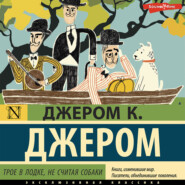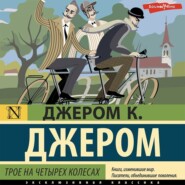По всем вопросам обращайтесь на: info@litportal.ru
(©) 2003-2024.
✖
The Second Thoughts of an Idle Fellow
Настройки чтения
Размер шрифта
Высота строк
Поля
I could not pump up much admiration for this washstand; I was feeling too wet.
“What do you do when you want to wash?” I asked, as together we reset the trap.
There fell upon him the manner of a conspirator revealing secrets. He glanced guiltily round the room; then, creeping on tip-toe, he opened a cupboard behind the bed. Within was a tin basin and a small can.
“Don’t tell the old boy,” he said. “I keep these things here, and wash on the floor.”
That was the best thing I myself ever got out of egg-boxes – that picture of a deceitful son stealthily washing himself upon the floor behind the bed, trembling at every footstep lest it might be the “old boy” coming to the door.
One wonders whether the Ten Commandments are so all-sufficient as we good folk deem them – whether the eleventh is not worth the whole pack of them: “that ye love one another” with just a common-place, human, practical love. Could not the other ten be comfortably stowed away into a corner of that! One is inclined, in one’s anarchic moments, to agree with Louis Stevenson, that to be amiable and cheerful is a good religion for a work-a-day world. We are so busy not killing, not stealing, not coveting our neighbour’s wife, we have not time to be even just to one another for the little while we are together here. Need we be so cocksure that our present list of virtues and vices is the only possibly correct and complete one? Is the kind, unselfish man necessarily a villain because he does not always succeed in suppressing his natural instincts? Is the narrow-hearted, sour-souled man, incapable of a generous thought or act, necessarily a saint because he has none? Have we not – we unco guid – arrived at a wrong method of estimating our frailer brothers and sisters? We judge them, as critics judge books, not by the good that is in them, but by their faults. Poor King David! What would the local Vigilance Society have had to say to him? Noah, according to our plan, would be denounced from every teetotal platform in the country, and Ham would head the Local Vestry poll as a reward for having exposed him. And St. Peter! weak, frail St. Peter, how lucky for him that his fellow-disciples and their Master were not as strict in their notions of virtue as are we to-day.
Have we not forgotten the meaning of the word “virtue”? Once it stood for the good that was in a man, irrespective of the evil that might lie there also, as tares among the wheat. We have abolished virtue, and for it substituted virtues. Not the hero – he was too full of faults – but the blameless valet; not the man who does any good, but the man who has not been found out in any evil, is our modern ideal. The most virtuous thing in nature, according to this new theory, should be the oyster. He is always at home, and always sober. He is not noisy. He gives no trouble to the police. I cannot think of a single one of the Ten Commandments that he ever breaks. He never enjoys himself, and he never, so long as he lives, gives a moment’s pleasure to any other living thing.
I can imagine the oyster lecturing a lion on the subject of morality.
“You never hear me,” the oyster might say, “howling round camps and villages, making night hideous, frightening quiet folk out of their lives. Why don’t you go to bed early, as I do? I never prowl round the oyster-bed, fighting other gentlemen oysters, making love to lady oysters already married. I never kill antelopes or missionaries. Why can’t you live as I do on salt water and germs, or whatever it is that I do live on? Why don’t you try to be more like me?”
An oyster has no evil passions, therefore we say he is a virtuous fish. We never ask ourselves – “Has he any good passions?” A lion’s behaviour is often such as no just man could condone. Has he not his good points also?
Will the fat, sleek, “virtuous” man be as Welcome at the gate of heaven as he supposes?
“Well,” St. Peter may say to him, opening the door a little way and looking him up and down, “what is it now?”
“It’s me,” the virtuous man will reply, with an oily, self-satisfied smile; “I should say, I – I’ve come.”
“Yes, I see you have come; but what is your claim to admittance? What have you done with your three score years and ten?”
“Done!” the virtuous man will answer, “I have done nothing, I assure you.”
“Nothing!”
“Nothing; that is my strong point; that is why I am here. I have never done any wrong.”
“And what good have you done?”
“What good!”
“Aye, what good? Do not you even know the meaning of the word? What human creature is the better for your having eaten and drunk and slept these years? You have done no harm – no harm to yourself. Perhaps, if you had you might have done some good with it; the two are generally to be found together down below, I remember. What good have you done that you should enter here? This is no mummy chamber; this is the place of men and women who have lived, who have wrought good – and evil also, alas! – for the sinners who fight for the right, not the righteous who run with their souls from the fight.”
It was not, however, to speak of these things that I remembered The Amateur and its lessons. My intention was but to lead up to the story of a certain small boy, who in the doing of tasks not required of him was exceedingly clever. I wish to tell you his story, because, as do most true tales, it possesses a moral, and stories without a moral I deem to be but foolish literature, resembling roads that lead to nowhere, such as sick folk tramp for exercise.
I have known this little boy to take an expensive eight-day clock to pieces, and make of it a toy steamboat. True, it was not, when made, very much of a steamboat; but taking into consideration all the difficulties – the inadaptability of eight-day clock machinery to steamboat requirements, the necessity of getting the work accomplished quickly, before conservatively-minded people with no enthusiasm for science could interfere – a good enough steamboat. With merely an ironing-board and a few dozen meat-skewers, he would – provided the ironing-board was not missed in time – turn out quite a practicable rabbit-hutch. He could make a gun out of an umbrella and a gas-bracket, which, if not so accurate as a Martini-Henry, was, at all events, more deadly. With half the garden-hose, a copper scalding-pan out of the dairy, and a few Dresden china ornaments off the drawing-room mantelpiece, he would build a fountain for the garden. He could make bookshelves out of kitchen tables, and crossbows out of crinolines. He could dam you a stream so that all the water would flow over the croquet lawn. He knew how to make red paint and oxygen gas, together with many other suchlike commodities handy to have about a house. Among other things he learned how to make fireworks, and after a few explosions of an unimportant character, came to make them very well indeed. The boy who can play a good game of cricket is liked. The boy who can fight well is respected. The boy who can cheek a master is loved. But the boy who can make fireworks is revered above all others as a boy belonging to a superior order of beings. The fifth of November was at hand, and with the consent of an indulgent mother, he determined to give to the world a proof of his powers. A large party of friends, relatives, and school-mates was invited, and for a fortnight beforehand the scullery was converted into a manufactory for fireworks. The female servants went about in hourly terror of their lives, and the villa, did we judge exclusively by smell, one might have imagined had been taken over by Satan, his main premises being inconveniently crowded, as an annex. By the evening of the fourth all was in readiness, and samples were tested to make sure that no contretemps should occur the following night. All was found to be perfect.
The rockets rushed heavenward and descended in stars, the Roman candles tossed their fiery balls into the darkness, the Catherine wheels sparkled and whirled, the crackers cracked, and the squibs banged. That night he went to bed a proud and happy boy, and dreamed of fame. He stood surrounded by blazing fireworks, and the vast crowd cheered him. His relations, most of whom, he knew, regarded him as the coming idiot of the family, were there to witness his triumph; so too was Dickey Bowles, who laughed at him because he could not throw straight. The girl at the bun-shop, she also was there, and saw that he was clever.
The night of the festival arrived, and with it the guests. They sat, wrapped up in shawls and cloaks, outside the hall door – uncles, cousins, aunts, little boys and big boys, little girls and big girls, with, as the theatre posters say, villagers and retainers, some forty of them in all, and waited.
But the fireworks did not go off. Why they did not go off I cannot explain; nobody ever could explain. The laws of nature seemed to be suspended for that night only. The rockets fell down and died where they stood. No human agency seemed able to ignite the squibs. The crackers gave one bang and collapsed. The Roman candles might have been English rushlights. The Catherine wheels became mere revolving glow-worms. The fiery serpents could not collect among them the spirit of a tortoise. The set piece, a ship at sea, showed one mast and the captain, and then went out. One or two items did their duty, but this only served to render the foolishness of the whole more striking. The little girls giggled, the little boys chaffed, the aunts and cousins said it was beautiful, the uncles inquired if it was all over, and talked about supper and trains, the “villagers and retainers” dispersed laughing, the indulgent mother said “never mind,” and explained how well everything had gone off yesterday; the clever little boy crept upstairs to his room, and blubbered his heart out in the dark.
Hours later, when the crowd had forgotten him, he stole out again into the garden. He sat down amid the ruins of his hope, and wondered what could have caused the fiasco. Still puzzled, he drew from his pocket a box of matches, and, lighting one, he held it to the seared end of a rocket he had tried in vain to light four hours ago. It smouldered for an instant, then shot with a swish into the air and broke into a hundred points of fire. He tried another and another with the same result. He made a fresh attempt to fire the set piece. Point by point the whole picture – minus the captain and one mast – came out of the night, and stood revealed in all the majesty of flame. Its sparks fell upon the piled-up heap of candles, wheels, and rockets that a little while before had obstinately refused to burn, and that, one after another, had been thrown aside as useless. Now with the night frost upon them, they leaped to light in one grand volcanic eruption. And in front of the gorgeous spectacle he stood with only one consolation – his mother’s hand in his.
The whole thing was a mystery to him at the time, but, as he learned to know life better, he came to understand that it was only one example of a solid but inexplicable fact, ruling all human affairs —your fireworks won’t go off while the crowd is around.
Our brilliant repartees do not occur to us till the door is closed upon us and we are alone in the street, or, as the French would say, are coming down the stairs. Our after-dinner oratory, that sounded so telling as we delivered it before the looking-glass, falls strangely flat amidst the clinking of the glasses. The passionate torrent of words we meant to pour into her ear becomes a halting rigmarole, at which – small blame to her – she only laughs.
I would, gentle Reader, you could hear the stories that I meant to tell you. You judge me, of course, by the stories of mine that you have read – by this sort of thing, perhaps; but that is not just to me. The stories I have not told you, that I am going to tell you one day, I would that you judge me by those.
They are so beautiful; you will say so; over them, you will laugh and cry with me.
They come into my brain unbidden, they clamour to be written, yet when I take my pen in hand they are gone. It is as though they were shy of publicity, as though they would say to me – “You alone, you shall read us, but you must not write us; we are too real, too true. We are like the thoughts you cannot speak. Perhaps a little later, when you know more of life, then you shall tell us.”
Next to these in merit I would place, were I writing a critical essay on myself, the stories I have begun to write and that remain unfinished, why I cannot explain to myself. They are good stories, most of them; better far than the stories I have accomplished. Another time, perhaps, if you care to listen, I will tell you the beginning of one or two and you shall judge. Strangely enough, for I have always regarded myself as a practical, commonsensed man, so many of these still-born children of my mind I find, on looking through the cupboard where their thin bodies lie, are ghost stories. I suppose the hope of ghosts is with us all. The world grows somewhat interesting to us heirs of all the ages. Year by year, Science with broom and duster tears down the moth-worn tapestry, forces the doors of the locked chambers, lets light into the secret stairways, cleans out the dungeons, explores the hidden passages – finding everywhere only dust. This echoing old castle, the world, so full of mystery in the days when we were children, is losing somewhat its charm for us as we grow older. The king sleeps no longer in the hollow of the hills. We have tunnelled through his mountain chamber. We have shivered his beard with our pick. We have driven the gods from Olympus. No wanderer through the moonlit groves now fears or hopes the sweet, death-giving gleam of Aphrodite’s face. Thor’s hammer echoes not among the peaks – ’tis but the thunder of the excursion train. We have swept the woods of the fairies. We have filtered the sea of its nymphs. Even the ghosts are leaving us, chased by the Psychical Research Society.
Perhaps of all, they are the least, however, to be regretted. They were dull old fellows, clanking their rusty chains and groaning and sighing. Let them go.
And yet how interesting they might be, if only they would. The old gentleman in the coat of mail, who lived in King John’s reign, who was murdered, so they say, on the outskirts of the very wood I can see from my window as I write – stabbed in the back, poor gentleman, as he was riding home, his body flung into the moat that to this day is called Tor’s tomb. Dry enough it is now, and the primroses love its steep banks; but a gloomy enough place in those days, no doubt, with its twenty feet of stagnant water. Why does he haunt the forest paths at night, as they tell me he does, frightening the children out of their wits, blanching the faces and stilling the laughter of the peasant lads and lasses, slouching home from the village dance? Instead, why does he not come up here and talk to me? He should have my easy-chair and welcome, would he only be cheerful and companionable.
What brave tales could he not tell me. He fought in the first Crusade, heard the clarion voice of Peter, met the great Godfrey face to face, stood, hand on sword-hilt, at Runny-mede, perhaps. Better than a whole library of historical novels would an evening’s chat be with such a ghost. What has he done with his eight hundred years of death? where has he been? what has he seen? Maybe he has visited Mars; has spoken to the strange spirits who can live in the liquid fires of Jupiter. What has he learned of the great secret? Has he found the truth? or is he, even as I, a wanderer still seeking the unknown?
You, poor, pale, grey nun – they tell me that of midnights one may see your white face peering from the ruined belfry window, hear the clash of sword and shield among the cedar-trees beneath.
It was very sad, I quite understand, my dear lady. Your lovers both were killed, and you retired to a convent. Believe me, I am sincerely sorry for you, but why waste every night renewing the whole painful experience? Would it not be better forgotten? Good Heavens, madam, suppose we living folk were to spend our lives wailing and wringing our hands because of the wrongs done to us when we were children? It is all over now. Had he lived, and had you married him, you might not have been happy. I do not wish to say anything unkind, but marriages founded upon the sincerest mutual love have sometimes turned out unfortunately, as you must surely know.
Do take my advice. Talk the matter over with the young men themselves. Persuade them to shake hands and be friends. Come in, all of you, out of the cold, and let us have some reasonable talk.
Why seek you to trouble us, you poor pale ghosts? Are we not your children? Be our wise friends. Tell me, how loved the young men in your young days? how answered the maidens? Has the world changed much, do you think? Had you not new women even then? girls who hated the everlasting tapestry frame and spinning-wheel? Your father’s servants, were they so much worse off than the freemen who live in our East-end slums and sew slippers for fourteen hours a day at a wage of nine shillings a week? Do you think Society much improved during the last thousand years? Is it worse? is it better? or is it, on the whole, about the same, save that we call things by other names? Tell me, what have you learned?
Yet might not familiarity breed contempt, even for ghosts.
One has had a tiring day’s shooting. One is looking forward to one’s bed. As one opens the door, however, a ghostly laugh comes from behind the bed-curtains, and one groans inwardly, knowing what is in store for one: a two or three hours’ talk with rowdy old Sir Lanval – he of the lance. We know all his tales by heart, and he will shout them. Suppose our aunt, from whom we have expectations, and who sleeps in the next room, should wake and overhear! They were fit and proper enough stories, no doubt, for the Round Table, but we feel sure our aunt would not appreciate them: – that story about Sir Agravain and the cooper’s wife! and he always will tell that story.
Or imagine the maid entering after dinner to say —
“Oh, if you please, sir, here is the veiled lady.”
“What, again!” says your wife, looking up from her work.
“Yes, ma’am; shall I show her up into the bedroom?”
“You had better ask your master,” is the reply. The tone is suggestive of an unpleasant five minutes so soon as the girl shall have withdrawn, but what are you to do?
“Yes, yes, show her up,” you say, and the girl goes out, closing the door.
Your wife gathers her work together, and rises.
“Where are you going?” you ask.
“To sleep with the children,” is the frigid answer.

















